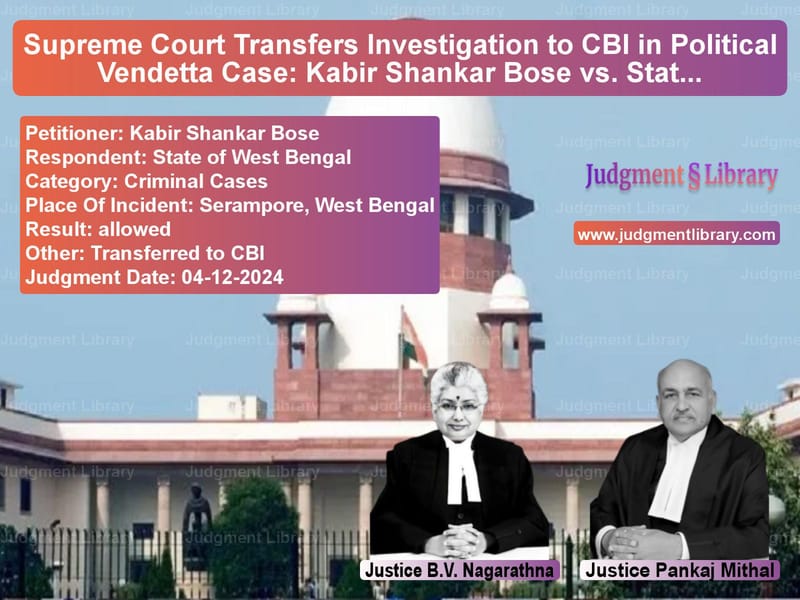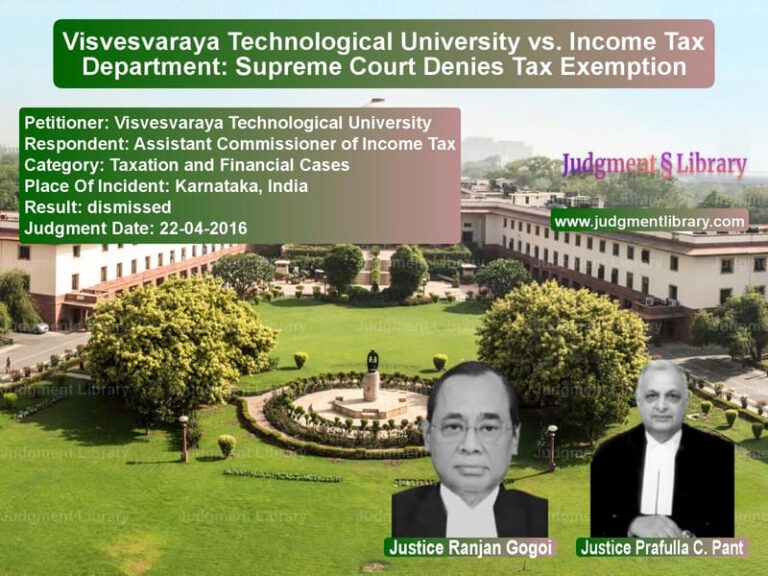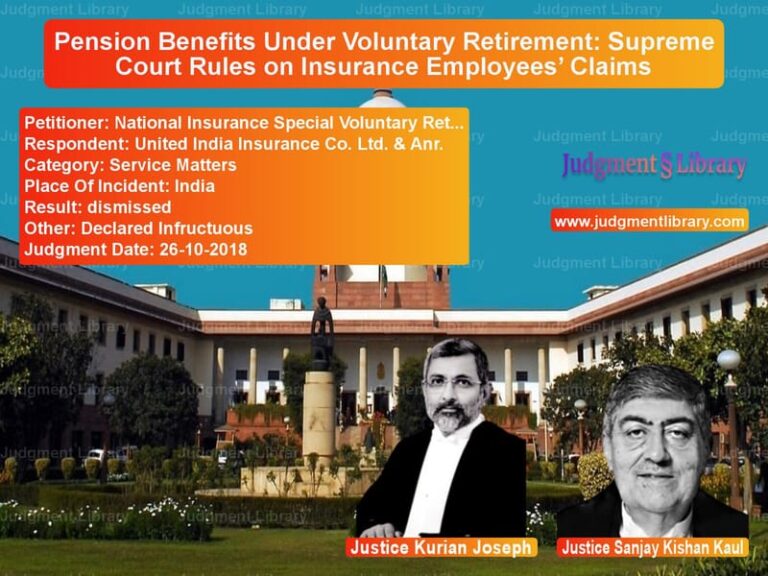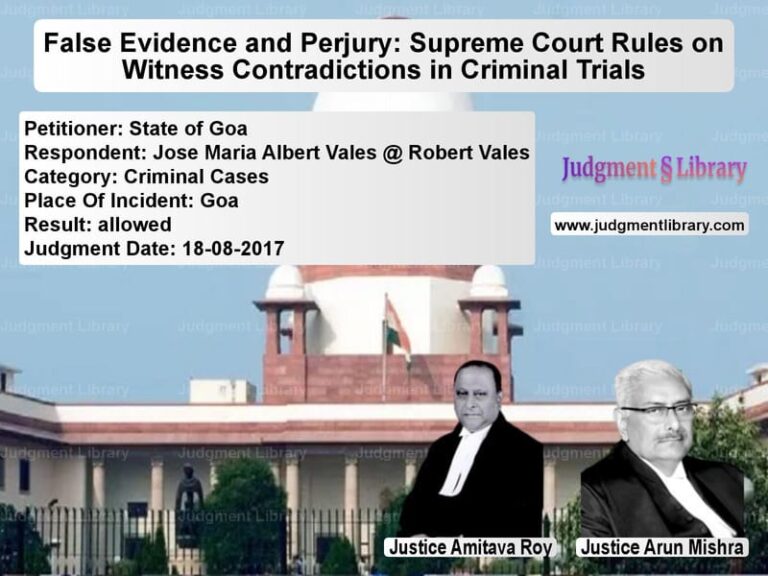Supreme Court Transfers Investigation to CBI in Political Vendetta Case: Kabir Shankar Bose vs. State of West Bengal
The Supreme Court of India recently delivered a significant judgment in the case of Kabir Shankar Bose vs. State of West Bengal, transferring the investigation of two criminal cases against the petitioner to the Central Bureau of Investigation (CBI). The Court ruled that the local police, under the influence of the ruling party in West Bengal, might not conduct a fair investigation. This decision underscores the importance of impartiality in criminal investigations, especially in politically charged cases.
Background of the Case
The petitioner, Kabir Shankar Bose, is an advocate by profession and a political figure. He was previously married to the daughter of Kalyan Banerjee, a sitting Member of Parliament (MP) from the Trinamool Congress (TMC) party. The marriage ended in a divorce in 2018, and Bose alleged that his former father-in-law continued to harass and victimize him using political influence. He claimed that the West Bengal state administration and police were being used as a tool for political vendetta against him.
The Criminal Cases Against Bose
Two First Information Reports (FIRs) were filed against the petitioner on December 7, 2020, at Serampore Police Station, West Bengal:
- FIR No. 400/2020: Filed under Sections 341 (wrongful restraint), 323 (voluntarily causing hurt), 325 (grievous hurt), 326 (causing hurt by dangerous weapons), 307 (attempt to murder), 354 (outraging modesty of a woman), 504 (intentional insult), 506 (criminal intimidation), and 34 (common intent) of the Indian Penal Code (IPC).
- FIR No. 401/2020: Filed under Sections 341, 325, 354A (sexual harassment), and 34 IPC.
Bose was arrested on the same day but was granted bail by the Additional Chief Judicial Magistrate, Serampore.
Petitioner’s Arguments
Bose approached the Supreme Court under Article 32 of the Constitution of India, seeking the transfer of investigation to an independent agency, citing the following reasons:
- He was being politically targeted due to his role as a spokesperson for the Bharatiya Janata Party (BJP).
- His ex-father-in-law, MP Kalyan Banerjee, was misusing state machinery to settle personal scores.
- The West Bengal police, controlled by the ruling party, would not conduct a fair investigation.
- His house and car were attacked by 200 TMC workers on December 6, 2020, and the police did not take action against them.
- Even his Central Industrial Security Force (CISF) security personnel, assigned due to previous threats, were attacked.
State of West Bengal’s Response
The West Bengal government opposed the petition, arguing:
- The allegations of political vendetta were baseless.
- The FIRs were registered based on cognizable offenses and had nothing to do with politics.
- Bose was evading the investigation and was declared an absconder.
- The petition was an attempt to bypass the due legal process.
CBI and CISF’s Observations
The Central Industrial Security Force (CISF), which was responsible for the petitioner’s security, submitted a report supporting Bose’s claims. The report stated:
- Bose’s vehicle was attacked and severely damaged.
- CISF officers were injured while protecting Bose.
- The local police did not allow CISF reinforcements to enter the premises.
The CISF confirmed that Bose had been provided security since April 10, 2019, due to genuine threats.
Supreme Court’s Observations
The Supreme Court, led by Justices B.V. Nagarathna and Pankaj Mithal, observed:
“The political scenario in the State of West Bengal is opposed to the party in power at the Centre. The possibility that the petitioner may not get a fair investigation at the hands of the local police cannot be brushed aside outrightly.”
The Court emphasized that investigations must not only be fair but also appear to be fair to maintain public confidence in the judiciary.
Key Legal Precedents Cited
The Court cited several landmark cases:
1. State of West Bengal vs. Committee for Protection of Democratic Rights
The Supreme Court ruled that an investigation can be transferred to the CBI when political interference is suspected.
2. Rubabbuddin Sheikh vs. State of Gujarat
The Court held that when high-profile officials are involved, the investigation must be conducted by an independent agency.
3. K.V. Rajendran vs. CBCID
The Court ruled that cases involving political figures should be investigated by an independent body.
Final Judgment
The Supreme Court ruled:
- The investigation of both FIRs was transferred to the CBI.
- The CBI must conduct an independent and impartial probe.
- All records related to the FIRs must be handed over to the CBI immediately.
- The trial should commence only after a fair and complete investigation.
Implications of the Judgment
This ruling has significant implications for India’s legal and political landscape:
- Protection of Political Opponents: The decision ensures that opposition leaders cannot be unfairly targeted by ruling parties.
- Strengthening Independent Investigations: The ruling reaffirms the judiciary’s role in safeguarding impartial investigations.
- Judicial Oversight on State Actions: The decision reinforces that state governments cannot misuse police forces for personal vendettas.
- Boosting Public Confidence: By transferring the case to the CBI, the Supreme Court has sent a strong message about fairness in the legal system.
Conclusion
The Supreme Court’s ruling in Kabir Shankar Bose vs. State of West Bengal is a landmark decision that highlights the judiciary’s role in preventing political misuse of law enforcement agencies. By transferring the investigation to the CBI, the Court has reinforced the principles of fairness and impartiality in criminal investigations. The case will now proceed under the watchful eye of an independent agency, ensuring that justice prevails.
Read also: https://judgmentlibrary.com/cbi-vs-jagat-ram-bribery-conviction-and-high-courts-reversal/
Petitioner Name: Kabir Shankar Bose.Respondent Name: State of West Bengal.Judgment By: Justice B.V. Nagarathna, Justice Pankaj Mithal.Place Of Incident: Serampore, West Bengal.Judgment Date: 04-12-2024.
Don’t miss out on the full details! Download the complete judgment in PDF format below and gain valuable insights instantly!
Download Judgment: kabir-shankar-bose-vs-state-of-west-bengal-supreme-court-of-india-judgment-dated-04-12-2024.pdf
Directly Download Judgment: Directly download this Judgment
See all petitions in Bail and Anticipatory Bail
See all petitions in Custodial Deaths and Police Misconduct
See all petitions in SC/ST Act Case
See all petitions in Judgment by B.V. Nagarathna
See all petitions in Judgment by Pankaj Mithal
See all petitions in allowed
See all petitions in Transferred to CBI
See all petitions in supreme court of India judgments December 2024
See all petitions in 2024 judgments
See all posts in Criminal Cases Category
See all allowed petitions in Criminal Cases Category
See all Dismissed petitions in Criminal Cases Category
See all partially allowed petitions in Criminal Cases Category







